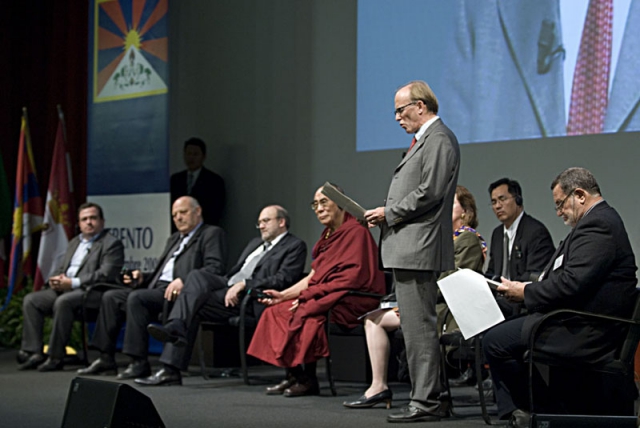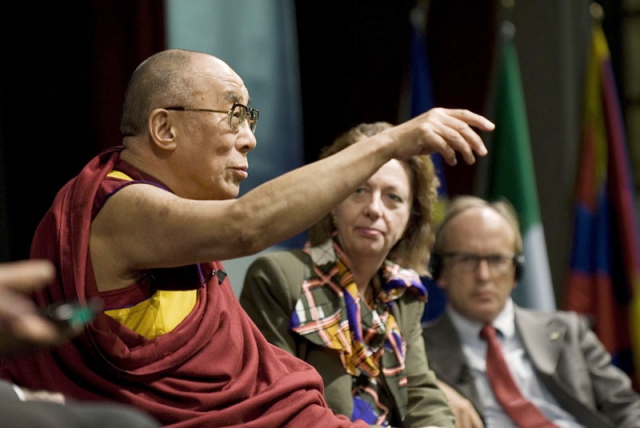From the Open-Publishing Calendar
From the Open-Publishing Newswire
Indybay Feature
Resolutions of Italy's Autonomous Regions in Support of Tibet and its People
Rome, The Tibet Post International: http://www.thetibetpost.com, November 17: “Welcome to our country, city and home, Your Holiness,” said President Luis Durnwalder of South Tyrol. His Holiness the Dalai Lama today visited Bolzano and Trento, the capital cities of the Regional Autonomous Governments of South Tyrol and Trento, in northern Italy. His Holiness expressed his appreciation for the support of the people and governments of the two autonomous regions.
President Durnwalder asked about the situation in Tibet. His Holiness replied that it has worsened. He said that after the March 10 2008 demonstrations across Tibet, he had hoped that the Chinese government would address Tibet’s real problems, but that unfortunately this hasn’t happened.
His Holiness showed President Durnwalder a map of Tibet and pointed out all the places where peaceful demonstrations took place in 2008. While looking at the map, President Durnwalder asked where Lhasa was. After showing him, His Holiness pointed to his birthplace in Amdo.
His Holiness said that, despite the grim situation in Tibet, things are changing and that more Chinese scholars are showing sympathy and understanding of the Tibetan struggle. Over 800 articles in Chinese have been written on the Tibetan issue, many of them in mainland China.
While in Bolzano, as part of the Meet the Nobel Laureates series of events, organized by the European Academy Bolzano, His Holiness took part in a question-and- answer session and spoke about his childhood, reincarnation, Tibetan Buddhism, non-violence and the Tibetan issue.
After meeting President Lorenzo Dellai of Trento in the afternoon, His Holiness addressed a round-table discussion on Autonomy for Tibet. Presidents Durnwalder and Dellai also spoke at this two-day conference, which was organized by the Autonomous Province of Trento, in cooperation with the Department of Legal Sciences, University of Trento and the European Academy in Bolzano. The Resolutions of Autonomous Regions in Support of Tibet are published below.
His Holiness expressed his appreciation of the organization of the autonomy conference. He said that this kind of conference sends a strong signal to China that the Tibet issue will not go away.
“We also want autonomy in People’s Republic of China. You enjoy all the rights mentioned on paper. In our case, even though the (Chinese) constitution mentions these rights, nothing is implemented,” he said.
“The Tibetans have 1,000 years old history. We have developed our own language, script and civilization. It is not from China.”
“Not a single Tibetan considers themselves as Chinese. Wherever I go, people say Dalai Lama of Tibet and not Dalai Lama of China.
His Holiness also made reference to Tibetan Buddhism, saying it is not called ‘China’s Tibetan Buddhism’.
“However”, he continued, “Tibetans are not seeking independence from China, and there has not been any change in the Chinese government’s position because they fear that if they give more freedom, it will bring more trouble.”
His Holiness will address the Fifth World Parliamentarians’ Convention for Tibet on November 18, in Rome. Over 200 parliamentarians from 28 countries, including over 100 Italian MPs, will attend this important convention. The two-day convention will be held in the Lower House of the Italian Parliament, and has been organized by the Italian Parliamentary Intergroup for Tibet.
Resolutions of Autonomous Regions in Support of Tibet
Trento, November 17: In March of 2008, the world was shocked by the violent repression by the Chinese Government of the demonstrations and uprising in Lhasa and many other parts of Tibet, in which Tibetans protested against the violation of their human rights, and for freedom.
In the run-up to the Olympic Games, the issue of Tibet therefore once again entered world public opinion. Shortly after the games, representatives of the Tibetan Government-in-exile presented the Memorandum on Genuine Autonomy for the Tibetan People to their Chinese counterparts.
In this memorandum, the Tibetan side agrees to accept Chinese sovereignty in exchange for real autonomy. Furthermore, the memorandum calls for respect of Tibetan identity and culture, while respecting the framework of the Chinese constitution.
The memorandum provides a basis for discussing the implementation of a right that was formally recognized by the Chinese Government, first in the Seventeen Point Agreement of 1951 and then with the establishment of the Tibet Autonomous Region, but has actually been denied since 1959, after the complete Chinese takeover and the induced settlement of Han Chinese, which is reducing Tibetans to a minority in their own territory.
The autonomy of the regions and provinces we represent is the best proof that conflicts can be settled in a non-violent way, fully respecting the rights of both sides, and that it is possible to preserve the culture and identity of a people, even a minority, through forms of autonomy and self-government. It has especially shown that the rights of minority groups and peoples are fully compatible with the sovereignty and unity of the state.
For these reasons we support the decision of the Dalai Lama and the Tibetan Government and Parliament-in-exile to pursue internal self-determination instead of independence.
The proposals contained in the Memorandum on Genuine Autonomy for the Tibetan People suggest the most effective ways to achieve recognition of the rights of Tibetan people to self-government in all regions of Tibet and for the preservation of their language, culture, and religion, as well as for the protection of their environment and natural resources.
The experiences of the many autonomous regions around the world have shown that conflicts can be prevented or overcome by respecting the fundamental rights of distinct peoples and ethnic and linguistic minorities, and enabling them to exercise the right to self-government while respecting the territorial integrity of the state.
We call on the Chinese Government to:
· Consider the existence and experience of these autonomous regions and their capacity to overcome conflict and maintain constructive institutional dialogues between respective central governments and the autonomous authorities.
· Engage in negotiations with the Dalai Lama and the Tibetan Government and Parliament on the basis of the Memorandum on Genuine Autonomy.
We call on the Chinese Government, the Dalai Lama and the Tibetan Government and Parliament in exile to:
· Speed up negotiations in order to ensure the implementation of genuine autonomy for the Tibetan people as soon as possible and to prevent the aggravation of conflict.
Finally, we ask the United Nations and the governments of its member states to support the objectives of this resolution, which is entirely in conformity with international law.
As territorial entities which enjoy autonomy and self-government, we offer our support for the achievement of a just and genuine autonomy for the regions of Tibet, which is in the interest of all parties.
We offer our expertise and lessons learned from our history, our statutes and our legal systems, which may provide useful examples on how to accommodate different territorial and ethnic identities within different national constitutions in ways that serve the interests of all parties in resolving their differences.
We offer our legal and administrative resources to support the search for and development of normative and legal provisions and structures for the realization of autonomy in keeping with the specific and complex situation in the People’s Republic of China.
We call on all autonomous regions to sign this resolution and to appeal to their respective national governments to support the quest for a just and mutually acceptable autonomy, which enables the Tibetan people to enjoy genuine self-government and peace within the framework of the Chinese constitution.
Report filed by Dekyi Dolka on the behalf of Mr Roberto Pinter member of Trentino Regional Parliament, the official organizer of the event.
For more information:
http://www.thetibetpost.com
Add Your Comments
We are 100% volunteer and depend on your participation to sustain our efforts!
Get Involved
If you'd like to help with maintaining or developing the website, contact us.
Publish
Publish your stories and upcoming events on Indybay.
Topics
More
Search Indybay's Archives
Advanced Search
►
▼
IMC Network




